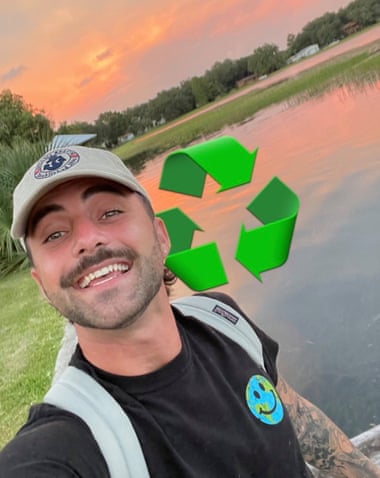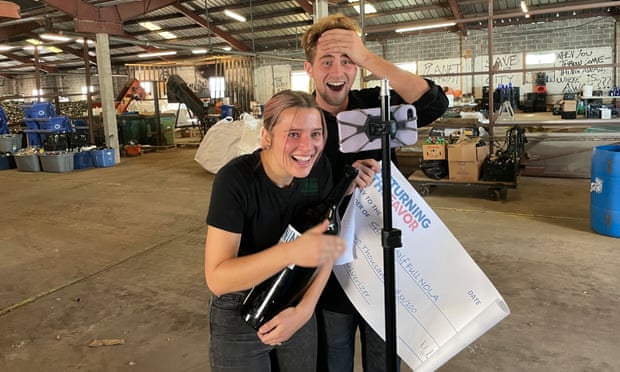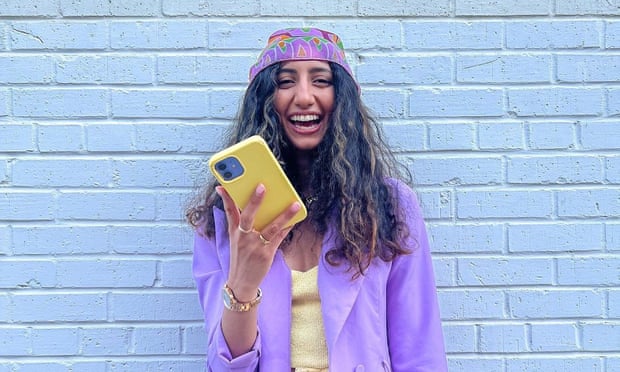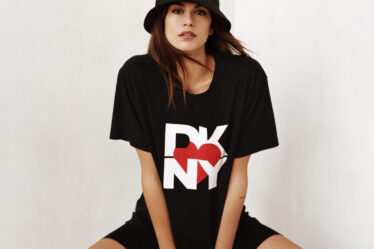
When it comes to the climate, each generation represents a different stage of grief.
In the 1960s, we ignored signs of climate change and steamed ahead with big energy. In the 1970s and 1980s, anger began to mount. Some scientists, like physicist Carl Sagan, raised red flags around a changing climate, while others, like the head of the UK Met Office John Mason, tried to debunk “alarmist US views”. Meanwhile, fossil fuel companies began investing in PR campaigns to amplify doubt about the climate crisis, a trend that continued well into the 1990s.
The 2000s saw the depression stage of grief. The science was undeniable and while many began to take action, the climate dread set in – something psychologists say is a big obstacle to taking action.
Enter Gen-Z. If you’ve spent much time on eco TikTok, you’ll know that they’re extraordinarily good at shaking off the climate dread and spreading climate optimism – perhaps it is the acceptance stage of grief. We spoke with a few of them to find out more.
Caulin Donaldson, 26, has been picking up trash from Florida’s beaches every day for more than 700 days
Trash Caulin (real name Caulin Donaldson) grew up in Tampa Bay, Florida, and has always loved the ocean. But the way some people behaved made him angry. “People would come up to me and they’re like, ‘this is my favorite beach in the world’, and then I would watch them leave all their trash right in the sand.”
“I was really mad about it. So I went to my first ever beach cleanup and the dude was like, ‘bro, all of us are mad, but you’ve got to fight this with positivity.’ I tried it and it did work – I was getting more reciprocation from the positive messages.”
Donaldson hasn’t looked back since and somehow makes picking up trash incredibly joyful. His 1.4m TikTok followers love watching his playful love of the planet, and high-energy personality.
Many of them have been inspired to pick up trash in their local areas: “People are like, ‘my kid loves watching you every day and now he’s out picking up trash’. I just got a comment saying ‘I was waiting for my friend’s track meet to end and I was really bored, so I just started picking up trash. I never would have thought to do that if I didn’t watch your videos.’ ”
An “anti-echo chamber” is how Caulin describes TikTok. “This is why TikTok has literally changed environmental activism,” he says. “The way the algorithm works is I can have 10 followers and go ‘hey guys, let’s recycle today’, and TikTok will put me in front of people who aren’t searching me and don’t know who I am”.
Climate activism is huge on the social media site – the hashtags #climatechange and #eco have 2.4bn and 1.6bn views respectively.
Franziska Trautmann, 24, turns glass into sand to save Louisiana’s eroding coastlines
“This is our planet too, and we don’t have time to wait for these old people to make decisions. We’re just doing it ourselves,” says Franziska Trautmann, AKA “that sand girl” on TikTok.
While sharing a bottle of wine with her friend Max Steitz in 2020, the 24-year-old reflected on the fact that her state, Louisiana, had no glass recycling facility. Her wine bottle was going to end up in landfill. “I wanted to work towards being a part of the solution instead of continuing to be a part of the problem,” she said. The US recycles only about a quarter of its glass. This pales in comparison with countries in Europe, which recycle between 60% and 80% of their glass.

Trautmann and Steitz founded Glass Half Full, Louisiana’s only glass recycling facility. The glass is turned into sand and used to restore the state’s eroding coastline. Louisiana loses an American football field’s worth of land every hour due to coastal erosion.
While studying at Tulane University in 2019, and with no money and growing student debt, the pair crowdfunded their first machine and began collecting bottles in the back garden of a frat house. They have diverted more than 2.2m pounds of glass from landfill since then, and have a huge recycling facility warehouse.
On TikTok, Trautmann answers questions from her audience with humility, without a hint of patronizing. Sand is the most exploited resource after water, and Trautmann regularly reminds her 260k TikTok followers that we’re in a global sand shortage. “You might be thinking: ‘what about the Sahara desert?’ Well, the sand we need for concrete and coastal restoration needs to be coarse and a bit angular, and desert sand is far too fine and rounded,” she says in one of her videos.
Glass Half Full caught the attention of the television host Mike Rowe. After filming what they thought was a documentary, Trautmann and Steitz were surprised with a $32,000 cheque on his show Returning the Favor. This allowed them to level up and buy a huge pulverizing machine.
Glass Half Full was awarded a National Science Foundation grant alongside scientists at Tulane University. Together with the scientists, Trautmann and Steitz have been conducting experiments with the glass sand looking for contaminants, and seeing how it works with native plants and marine wildlife. The results were so positive that the group just laid 15 tonnes of glass sand on the coast, and worked with the Pointe-au-Chien tribe to restore part of their land.
“My message to people is always to take my story as something that you can also do. So we saw an issue in our community, and instead of continuing to wait for someone else to solve it, we decided to just go for it. We didn’t have any money, any recycling knowledge, we didn’t know about glass and sand issues. We learned everything along the way. If you see a problem that you want to solve, just go for it.”
Zahra Biabani, 23, wants to displace the fast-fashion industry by founding the world’s first sustainable clothing rental company
She is just out of college and writing a book on the power of climate optimism, while also launching the world’s first sustainable fashion rental marketplace. She creates regular TikTok videos educating her audience on environmental issues. Oh, and she just did a TED Talk.
Zahra Biabani really makes you reflect on what’s possible to do as a 23-year-old.

The environmentalist from Houston, Texas, is about to launch In The Loop, her mission to make sustainable and ethical brands more accessible to young people.
Through research, she found that the main barriers for young people in renting clothes were cost, size exclusivity, and the lack of styles that people want to wear.
Biabani is bringing together a marketplace of eco-friendly brands with stringent entry requirements. “We make sure they pay a living wage, that 50% or more of their garments are made with intentionally sourced fabrics, and we also make sure that they offer public five- and 10-year sustainability goals,” she says.
For one-time renters, each piece of clothing is 75% cheaper to rent on her site than the retail price. You get the items for three and a half weeks, return them using the included returns label on the reusable shipping bags, and then In The Loop does the cleaning, restocking, and ships out the next month’s cycle. And this is all done from Biabani’s parents’ garage.
When Biabani learned that 56% of Gen Zers believe humanity is doomed, she started posting weekly positive climate news stories, which were met with a lot of gratitude. Climate optimism, Biabani says, isn’t about discrediting the trove of science and evidence that the climate crisis threatens our future on Earth – it’s a way to cultivate hope so people continue fighting.
“We’re not able to make change if we don’t believe change is possible. So climate optimism is just a framework for unlocking the full potentiality of climate solutions that we desperately need.”
Thomas Lawrence, 23, is building a sustainable marketplace to take on Amazon
“I think it’s time for Congress to be lobbied the other way. I’m not a blind optimist, but we also have to accept the world as it is. Money makes the world go round. I’m not saying I want it to be that way. But that’s the way it is,” says Thomas Lawrence, the founder of Good People Inc.
“If big oil, big meat and whatever else are going to lobby Congress in the US with their millions to keep their pockets heavy and to keep the world they want it to be, then why can’t we do the same thing? It’s time there was a bit more influence for the right side of history,” he says.
The 23-year-old entrepreneur is building a corporation that “only does good for the people and the planet.” Good People Inc wants to take on Amazon and give people an ethical, value-driven alternative. “They [Amazon] created a market that they’re now the only player in, and that’s the reason that lots of people can’t give up Amazon. The definition of a monopoly is that consumers don’t have another choice.”
Allow TikTok content?
This article includes content provided by TikTok. We ask for your permission before anything is loaded, as they may be using cookies and other technologies. To view this content, click ‘Allow and continue’.
Good People Inc is already providing more than 200 products to people in the UK and is growing each day; the US site has also just launched. The company was born from a frustration with the way marketing tricks us. “I hate all these brands that make people spend their hard earned money by making you feel inadequate, or like you need something when you don’t,” he says. “A big problem for consumers isn’t always that they can’t get their stuff, the issue is that they desire the stuff in the first place.”
In order to sell products on the marketplace, retailers have to pass a number of regulations that Lawrence has put in place, including zero waste packaging, no plastic use, transparency about the provenance of ingredients, and how staff are treated.
What is it about Gen-Z that is resulting in so much direct action and optimism? “I think that my generation and millennials are starting to realize they have to take the matter into their own hands, rather than waiting on the people that are currently in charge to help.”
If all goes to plan, Good People Inc will end up as a co-op, owned by those who work there, and will have the capital and power to take on corporations in their own playground.



